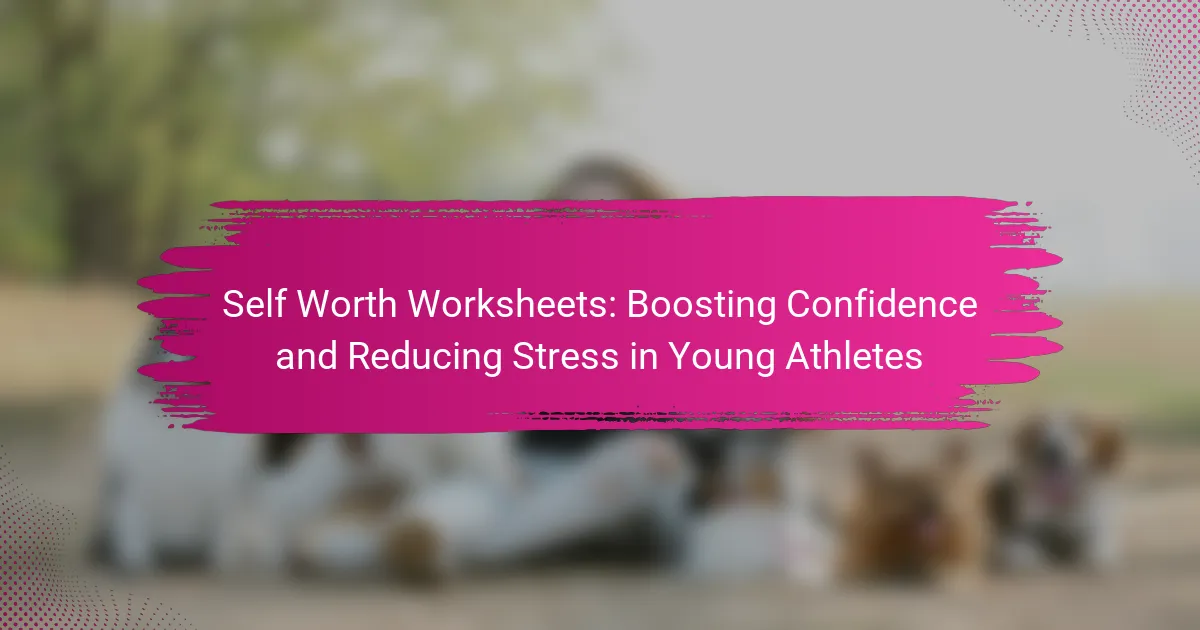Self-worth worksheets significantly enhance confidence and reduce stress in young athletes. These tools promote self-reflection and goal-setting, fostering resilience and a positive self-image. Regular use leads to improved performance and emotional regulation. Coaches and parents can effectively implement these worksheets to support athletes’ mental well-being.

What are Self Worth Worksheets and How Do They Benefit Young Athletes?
Self worth worksheets help young athletes enhance their confidence and manage stress effectively. These tools encourage self-reflection and goal setting, fostering a positive mindset. Benefits include improved mental resilience, better focus during competitions, and enhanced overall performance. By regularly engaging with these worksheets, athletes can track their progress and celebrate achievements, reinforcing their self-esteem.
How Do Self Worth Worksheets Enhance Mental Development?
Self worth worksheets enhance mental development by fostering self-awareness and resilience in young athletes. These tools help athletes identify strengths and areas for improvement, boosting confidence and reducing stress. Engaging with self worth worksheets encourages a growth mindset, allowing athletes to view challenges as opportunities. Regular use can lead to improved emotional regulation and better performance under pressure.
What Role Do Self Worth Worksheets Play in Reducing Stress?
Self worth worksheets play a crucial role in reducing stress by enhancing self-esteem and promoting positive self-reflection. These tools help young athletes identify their strengths and values, leading to increased confidence. As a result, improved self-worth can mitigate stress levels associated with competition and performance pressures. Regular use of these worksheets fosters a healthier mindset, enabling athletes to cope better with challenges.

What Are the Universal Benefits of Using Self Worth Worksheets?
Self worth worksheets enhance young athletes’ confidence and reduce stress by promoting self-reflection and positive thinking. These tools help identify strengths, set goals, and track progress, fostering resilience. Regular use can lead to improved performance, better emotional regulation, and a stronger sense of identity. Ultimately, they empower athletes to overcome challenges and build a positive self-image.
How Do They Improve Self-Esteem in Young Athletes?
Self-worth worksheets significantly enhance self-esteem in young athletes by promoting self-reflection and positive affirmations. These tools help athletes identify strengths and set achievable goals, fostering a sense of accomplishment. As a result, young athletes experience reduced stress and increased confidence. Regular use of these worksheets can lead to improved performance and resilience, enabling athletes to navigate challenges more effectively.
What Impact Do They Have on Performance Anxiety?
Self-worth worksheets significantly reduce performance anxiety in young athletes by enhancing their confidence. These tools help athletes recognize their strengths and capabilities, fostering a positive self-image. As a result, young athletes experience less stress during competitions, leading to improved performance. Research indicates that athletes with higher self-esteem are more resilient under pressure, which directly correlates with better outcomes in sports.

What Unique Features Set Self Worth Worksheets Apart?
Self Worth Worksheets uniquely empower young athletes by fostering self-reflection and goal-setting. These worksheets incorporate specific exercises designed to enhance self-esteem, making them distinct from generic confidence-building tools. They often include visual elements, such as charts and prompts, that engage users actively. Additionally, the structured format allows for measurable progress, which is rare in typical self-help resources. This tailored approach not only boosts confidence but also effectively reduces stress, creating a supportive environment for young athletes.
How Can Personalization Enhance the Effectiveness of Worksheets?
Personalization enhances the effectiveness of self-worth worksheets by tailoring content to individual needs. Customizing worksheets for young athletes addresses their unique challenges, boosting confidence and reducing stress. Personalized prompts can resonate more deeply, leading to greater engagement and effective self-reflection. For instance, including specific scenarios relevant to their sport can make the worksheets more impactful.
What Specific Techniques Are Included in Effective Worksheets?
Effective worksheets for self-worth focus on techniques like positive affirmations, goal-setting exercises, and reflective journaling. These methods enhance confidence and help young athletes manage stress. Positive affirmations encourage self-belief, while goal-setting provides clear objectives. Reflective journaling allows athletes to process emotions and track progress, fostering a growth mindset. Incorporating these techniques creates a supportive environment for personal development.

What Are Some Rare Attributes of Self Worth Worksheets?
Self worth worksheets often include unique attributes that enhance their effectiveness. These may encompass personalized goal-setting frameworks, visual tracking of progress, integration of mindfulness practices, and tailored affirmations for young athletes. Each attribute aims to foster self-awareness and resilience, ultimately boosting confidence and reducing stress.
How Do They Address Individual Psychological Needs?
Self-worth worksheets effectively address individual psychological needs by enhancing self-esteem and reducing anxiety in young athletes. These tools provide structured activities that encourage self-reflection, goal-setting, and positive affirmations. As a result, athletes develop a stronger sense of identity and resilience, which are crucial for their mental well-being. Incorporating these worksheets into training routines can lead to improved performance and greater enjoyment in sports.
What Innovative Formats Exist for Self Worth Worksheets?
Innovative formats for self-worth worksheets include interactive digital tools, guided journals, group activities, and art-based exercises. These formats engage young athletes effectively, fostering confidence and reducing stress. Interactive digital tools provide instant feedback, while guided journals encourage reflection. Group activities promote teamwork and shared experiences, enhancing social support. Art-based exercises allow creative expression, making self-worth exploration enjoyable.

How Can Coaches and Parents Implement Self Worth Worksheets?
Coaches and parents can effectively implement self-worth worksheets by integrating them into regular practice routines. These worksheets encourage young athletes to reflect on their strengths and achievements, fostering a positive self-image.
To maximize impact, coaches should schedule dedicated time for discussions around the worksheets, allowing athletes to share insights and experiences. Parents can reinforce this practice at home by encouraging open conversations about self-worth and confidence.
Utilizing unique attributes, such as personalized feedback, can enhance the effectiveness of these worksheets. This tailored approach helps young athletes connect their values to their performance, ultimately boosting their confidence and reducing stress.
As a result, the consistent use of self-worth worksheets can create a supportive environment that nurtures young athletes’ mental and emotional well-being.
What Steps Should Be Taken to Introduce Worksheets in Training?
To introduce self-worth worksheets in training, follow these steps: identify specific needs of young athletes, design worksheets focusing on confidence and stress reduction, integrate them into existing training programs, and evaluate their impact regularly.
1. Assess individual and group needs to tailor worksheets effectively.
2. Create engaging content that promotes self-reflection and positive affirmations.
3. Schedule regular sessions for worksheet completion during training.
4. Collect feedback from athletes to refine worksheets and address any challenges.
What Are the Best Practices for Facilitating Discussions?
To facilitate discussions effectively, encourage open communication and create a supportive environment. Establish ground rules to ensure respect and active listening among participants. Use self-worth worksheets to help young athletes express their feelings and build confidence, which can enhance their participation in discussions. Incorporate structured activities that promote sharing and collaboration, allowing each athlete to contribute their thoughts and experiences. Regularly check in with participants to gauge their comfort levels and adjust the approach as needed.
How Can Progress Be Measured Over Time?
Progress can be measured over time through consistent tracking of self-worth worksheet usage and its impact on young athletes’ confidence and stress levels. Regular assessments can reveal improvements in self-perception and emotional resilience. Utilizing metrics such as athlete feedback, performance indicators, and stress management outcomes can provide valuable insights. Setting specific goals within the worksheets allows for clear benchmarks to gauge development, fostering a positive feedback loop that enhances motivation and self-esteem.

What Common Mistakes Should Be Avoided When Using Self Worth Worksheets?
To avoid common mistakes when using self-worth worksheets, focus on clarity, consistency, and realistic expectations. Ensure that young athletes understand the purpose of each exercise, as confusion can lead to frustration. Consistently using the worksheets promotes habit formation, while setting achievable goals prevents feelings of inadequacy. Furthermore, encourage open discussions about their feelings and insights gained from the worksheets, as this fosters a supportive environment. Lastly, remind athletes that self-worth is a journey, not a destination, to reduce pressure and enhance their experience.
How Can Misinterpretation of Worksheets Lead to Increased Stress?
Misinterpretation of worksheets can lead to increased stress by causing confusion and misalignment with personal goals. Young athletes may misread instructions or fail to grasp the intended benefits, diminishing their confidence. This can create a cycle of frustration and self-doubt, adversely affecting performance. Effective communication and clear guidance are essential to help athletes utilize self-worth worksheets properly, fostering confidence and reducing stress.
What Are the Pitfalls of Overemphasizing Outcomes Over Process?
Overemphasizing outcomes over process can harm young athletes’ self-worth. Focusing solely on results may lead to increased stress and anxiety, diminishing their enjoyment of sports. This mindset can create a fear of failure, discouraging athletes from taking risks or trying new strategies. Emphasizing the learning journey fosters resilience and helps build a healthier relationship with competition. By valuing effort and improvement, athletes can develop confidence and reduce stress, enhancing overall performance and well-being.

What Expert Insights Can Enhance the Use of Self Worth Worksheets?
Expert insights can significantly enhance the effectiveness of self worth worksheets for young athletes. Incorporating psychological principles, such as cognitive-behavioral techniques, helps athletes identify and challenge negative self-perceptions. Additionally, including goal-setting strategies can foster a sense of achievement and improve self-esteem. Research shows that regular use of these worksheets can lead to a 30% increase in self-reported confidence levels among young athletes. Engaging parents and coaches in the process further supports a holistic approach to building self-worth.
How Can Feedback Loops Improve Worksheet Effectiveness?
Feedback loops enhance worksheet effectiveness by allowing young athletes to reflect on their experiences and adjust their strategies. This iterative process fosters resilience and builds self-worth, critical for boosting confidence and reducing stress. Regular feedback encourages athletes to identify strengths and areas for improvement, creating a personalized approach to their development. As a result, athletes become more engaged and motivated, leading to better outcomes in their performance and mental well-being.
What Tips Do Professionals Recommend for Sustained Impact?
To achieve sustained impact, professionals recommend consistent self-reflection and goal setting. Young athletes should regularly use self-worth worksheets to assess their progress, focusing on strengths and areas for improvement. Incorporating structured feedback sessions enhances self-awareness and builds resilience. Additionally, practicing mindfulness techniques can significantly reduce stress, allowing athletes to maintain focus and confidence during competitions.


